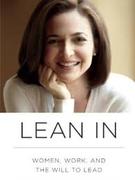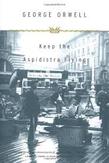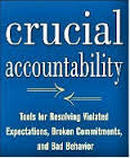 My wife and I went on a few long road trips recently, and we passed the time in the car listening together to the audio version of Lean In: Women, Work, and the Will to Lead by Sheryl Sandberg. The book ended up sparking a number of deep conversations and questions, and Suzanne even took notes! Through the process, I learned a lot about my wife, the perspective of professional women, and what implicit biases I personally have. I liked how Sheryl was very realistic and honest about her own struggles and the (sometimes blatant) discrimination she faced and which others routinely face. I liked how she gave concrete examples/scripts and shared a lot of meaningful personal details. I learned to appreciate much more how hard my wife works to achieve her goals and gain respect in ways that men receive a lot more by default in professional settings. I understood much more deeply the difficulty of balancing work and family life for a woman, and I really liked Sheryl's tips for professional couples. I saw my wife learning a lot from Sheryl's example and feeling like she's not alone in many of the feelings she has, like "imposter syndrome" (which I share too) and struggling against the default stance of not leaning in when there are risks. I learned some new ideas and models for how a couple can raise a family while also pursuing meaningful goals as independent adults. I also recognized better the role I can play in supporting her and pushing her to go after her dreams and believe in herself. Below were our biggest takeaways from the book. I feel lucky to have Suzanne in my life and to have been able to share this experience with her, learning about each other and the world around us.
0 Comments
 Introduction The fifth selection of Half Half Man’s Book Club was George Orwell’s Keep the Aspidistra Flying. I must admit it was quite a downer -- up until the last pages. I kept feeling angry and disappointed by the main character, Gordon Comstock, who is clearly talented but lets his talents go to waste because of absurd principles he stubbornly holds on to. In the end it is love (by accident) that forces him to wake up and find a way to make his life meaningful, and we can learn a lot from his sad story and apply it to our own artistic endeavors which often seem no less difficult than Gordon’s. Dedication to art and quality It’s immediately apparent to the reader that Gordon is talented and has a keen eye and ear for words and a deep love of books. He hates the idea of “jobs” and the only job that’s not completely offensive is working in a bookstore. For him, there is a clear delineation between books that are crap and books that are gold. When he comes home at night, penniless and hungry, his only consolation is rereading his favorite books. And when he sees advertisements or prose that’s poorly written, it incites in him a visceral anger. He is not just a “fan” of the English language used right; it is his life. And it is in the same way that he knows his body that he knows his art and written creations. Reading these things about Gordon reminded me of my favorite magicians and their dedication to their art and to quality. As I have tried to grow as a student myself, my appreciation has deepened for the immense amount of time and effort that professionals put into each element of their routines, each word, gesture, and move being an artistic and thoughtful choice. Real artists strive -- in fact, are ready to suffer -- for quality in the same way, no matter the art form. Principled or stubborn? Gordon’s love of poetry and art is his strength, but it is also the cause of his downfall. He turns his love of art into a hate for money (which is further reinforced by his poverty). In his mind, he can’t reconcile how life and society can be good while also being linked to money. For him, the most despicable idea is that of a “real job.” He struggles to figure out how to live by writing poetry and making art, and he fails to take advantage of opportunities that come his way even when he gets lucky breaks. As a result, he lets his skills and art go to waste out of pure stubbornness. This is a pretty sad and extreme counterexample to how an artist should be. There is certainly virtue in dedicating yourself to a principled existence and to giving 100% of your time and energy to a single cause, but the principles Gordon chose were counterproductive, and he never really dedicated himself in a professional way to his own art. Gordon’s is certainly a cautionary tale for any magician considering going full-time or struggling with a job in general. No matter what you apply yourself to -- magic or otherwise -- you always need to do your best, be productive, and focus on reality and principles that will lead to a rational, happy life. Professionalism and creativity This book certainly gets across the fact that creativity in art is hard work. But that’s not something that Gordon really knew how to do well. It’s clear how he struggled to write and create poetry, but it’s also clear how he lost the battle to procrastination, wasted time, and writer’s block. In the rare times he actually showed his work to others, he either squandered whatever success he found or let himself get completely hammered by rejection and self-doubt. He was not one to take feedback constructively. Gordon’s story is a warning to anyone who loves his or her art but struggles to do it professionally. Luckily, there is a better example and process, described eloquently by Steven Pressfield in his book, The War of Art (1). Pressfield does an excellent job effectively describing Gordon and his maladies in the concept which he coins “resistance.” It’s anything that gets in the way of sitting your butt down to write or create, to do the annoying, frustrating, and difficult work that needs to be done. Pressfield offers the concept of “turning pro” in the abstract sense as the solution: adopting the habits of a professional in your approach to art. This means having a morning routine, which many of the most successful artists do (2), showing up every day to your art like it’s your job, and forcing yourself through habit and explicit rules to get work done at all cost, even if it’s minimal or initially crappy. Conclusion The fifth selection of Half Half Man’s Book Club was a sad but important lesson in the struggle to create art in a practical real world. In the end, it is love that forces Gordon to use his talents and create art through his job. It is sad that he chose to give up on his poetry to do that, but as a professional, he will be able to create and produce words that impact people’s lives positively, and maybe one day he can return to the poetry that got him started. If he had approached his art like a professional from the beginning, it’s possible his life may have turned out quite differently. References 1. Steven Pressfield. The War of Art: Break Through the Blocks and Win Your Inner Creative Battles. 2002.  (It's been a wild and crazy busy summer for me, and the reading and all other hobbies have taken a toll. I'm now getting back into a better reading rhythm and hope to catch up soon.) I've recently faced a number of personal and professional situations where people didn't live up to what they promised. To provide some tools and perspective for this situation, a colleague recommended I read Crucial Accountability: Tools for Resolving Violated Expectations, Broken Commitments, and Bad Behavior by Kerry Patterson, Joseph Grenny, Ron McMillan, Al Switzler, and David Maxfield. I had read their predecessor book, Crucial Conversations, and enjoyed that. This book was a nice build on the earlier one, and what I enjoyed most was the actual verbatim quotes and conversation snippets. I enjoy this sort of specific advice, with exact language that can be used in different scenarios, more than general, high-level advice. One of my biggest takeaways is the CPR model of having accountability conversations. The first conversation should be about the content (C) of what went wrong. If the problem continues, the second conversation should be about the pattern (P). And the third should be about the relationship (R). But as I said, what I found most useful were the concrete examples of language for how to start these conversations and how to frame the accountability issues while maintaining respect and safety. |
Archives
June 2024
Categories
All
Subscribe |
 RSS Feed
RSS Feed
